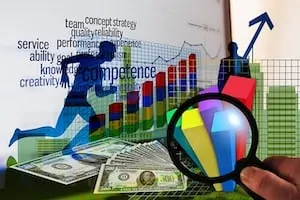Regardless of what industry your company is in you are dependent on suppliers to operate your company. Thus it makes sense to have a Supplier Relationship Management program.
Suppliers provide components for products you manufacture and sell. Suppliers provide services for products or services you take to market. Suppliers move your goods from one point to another. And suppliers provide the goods, supplies, software and other items required by every function in your company to conduct day to day business.
Without suppliers no company could survive, let alone thrive.
Yet historically too many people have treated suppliers transactionally with no to little regard for fostering mutually beneficial relationships.
Going forward it will no longer be sufficient to just have passive supplier relationships. Companies must have a formal, strategic Supplier Relationship Management (SRM) program!
A History
I began my career with IBM. One of IBM’s fundamental values and principles was “Respect for the Individual”. Put another way it meant treating others the way you yourself would like to be treated.
This stuck with me throughout my entire career. “Respect for the Individual” didn’t have a caveat that this applied only to fellow employees. It applied to anyone and everyone, including suppliers.
My father reinforced this with me by his example. He spent his entire career in Purchasing and Procurement. He always respected his fellow employees and suppliers, built those relationships, and worked with the highest level of integrity.
Looking Down on Suppliers
But it became apparent to me that whenever there were problems with a supplier, whether it be cost, quality or delivery for instance, there were those would would talk about those suppliers in a derisive manner. It didn’t matter that we had just as many internal problems, if a supplier caused an issue some people were very quick to demean those suppliers who were endeavouring to support us.
A not so uncommon view was that suppliers were engaged to provide what we wanted, when we wanted it under the terms that we wanted. And that was the extent of the relationship. If they failed we would replace them. If they succeeded we would reward them with more business. That was the extent of the supplier relationship.
This misguided view of suppliers from the past can unfortunately still be found today.
It All Starts with Ethical Behaviour and Integrity
Very early on in my career a fellow employee in my department was suddenly fired. It turns out he was taking bribes from a supplier in exchange for giving them business. Both the employee and the supplier were corrupt. They proved that they could not be trusted. All of those relationships ended.
Don’t go over to the Dark Side!
Supplier Collaboration is Mutually Beneficial
At one point I was put in charge of a global manufacturing operations team. Numerous operational problems had compromised our ability to meet our customer’s expectations and to make a profit and return on investment.
As we worked on our roadmap to turn the situation around I was introduced to a consultant. I discussed our situation with him and he suggested to me that I needed a workshop with all of our suppliers together, even if they were competitors. In that workshop I would explain our situation and enlist their support to help us with ideas and actions to turn the situation around. Nobody I knew had tried this before but we needed all the help we could get so I scheduled the session.

Despite some internal pushback about exposing suppliers to too much internal information I moved forward anyways. We held the session and gave the suppliers a blunt and transparent view to our dilemma.
If they helped us turn this situation around we would all benefit: we would get more business and in turn they would get more business. If they didn’t help us there was a real question about the survival of our division.
Within a few weeks of the workshop ideas and plans started coming in from suppliers. Overall they were wonderful ideas. In some cases there were actions that the suppliers could take within their own operation to help us. In other cases there were changes they needed from us. And still other ideas required some give and take between both us and the suppliers.
The result was a series of real actions we could take that would have significant, meaningful results to benefit all of us. Without this collaboration we could not have come up with this results on our own and our survival would have been in question. Instead we secured our future, for now, as well as enabling the retention and growth of business for our supplier partners.
Supplier collaboration will lead to mutually beneficial outcomes.
Supplier Scorecards and Awards Must be Objective
In another situation the Commodity Management organization had formalized a scorecard to measure, communicate and address supplier performance. The scorecard included most of the standard metrics: on time delivery, quality, cost competitiveness, terms and conditions, etc.
The scorecard format, metrics, and objectives were shared openly with suppliers. It is important that if you are going to measure someone’s performance that they know what the basis for measurement is.
The scoring allowed for the ranking of suppliers both within and across commodities. We could share our view of performance with suppliers transparently with the aim of helping them improve, sharing information on how their competitors (without sharing names) were faring, and all with a view to improvement.
Top performing and preferred suppliers would be in a position to be awarded new business and preferential consideration.
Formal Relationship Management is Critical
The underlying principle for the program was that of partnership. We relied on our suppliers for our success, growth and survival. This was reinforced by a formal program focussed on our relationship with the people in a supplier’s organization. Who did we know? How strong were those relationships? Were we connected to decision makers? What were the goals of the supplier and how could we help them achieve their goals?
We followed this up with planned meetings to help build these relationships, establish new and stronger connections, sharing strategies and objectives, and looking for ways to help each other.
Inevitably problems would arise for which our strongest path to resolution was accomplished because of relationships. Parts would go on allocation, customers would make drastic demand changes with no notice, new sales would require creative solutions from us and our suppliers, and on and on.
People like working with people they like, that they can trust, and that they can rely on. Trust is the “X” Factor. Taking the time to build those relationships was truly the core of our successful Supplier Relationship Management program.
Supplier Recognition Gone Right and Gone Wrong
I have worked in companies that even to this day have no supplier recognition and award program of any kind. These companies simply don’t get it. Their view is that by blessing suppliers with purchase orders that is enough. They fail to see the value in building those relationships.
At the other extreme I see supplier recognition programs that are really just going through the motions. Year after year the same suppliers are being recognized. People play favourites and fail to have an avenue for exciting new suppliers to get in the door. As a result the awards program loses all meaning which in turn undermines the legitimacy of entire Supplier Relationship Management program.
It is very important to have a balance. I am sure there are suppliers who, year after year, continue to perform at the top of their game in their field, and for whom ongoing recognition is appropriate. But for many companies this can lead to a sense of complacency.
Ensure that you are always looking for the next up and coming supplier. They are out there, they are hungry, and they will push the envelop on expectations and deliverables that make them worthy of your recognition.
Conclusion
Gone are the days when transactional relationships are acceptable or sufficient. That being said we know that there are many who treat their suppliers in just this manner.
But the truly strategic and enlightened Procurement leaders of today and tomorrow recognize that a formal Supplier Relationship Management program is a cornerstone requirement for any successful organization.
Treat suppliers the way you would like to be treated by your customers. And treat people, regardless of whether they work in your company or a supplier organization exactly the way you would like to be treated.


Comments are closed.